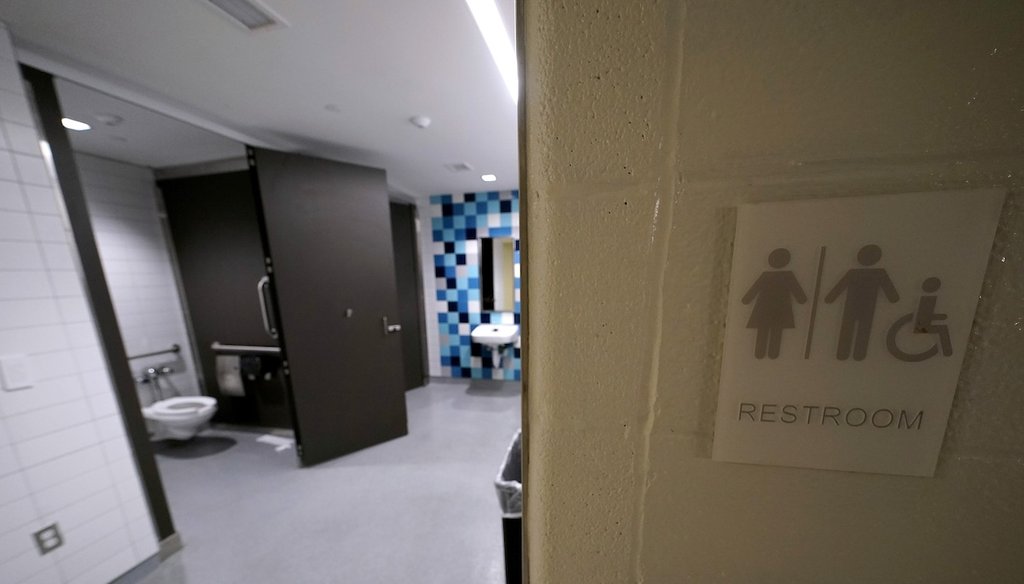Get PolitiFact in your inbox.

A newly constructed gender neutral bathroom is seen June 16, 2023, at Shawnee Mission East High School in Prairie Village, Kan. (AP)
If Your Time is short
-
More than a dozen states prohibit transgender people from using bathrooms, locker rooms or changing rooms that align with their gender identities in some government-owned buildings, including public schools.
-
We found little available information on how the laws are being enforced and no instances in which people were criminally charged for violating the Utah or Florida laws, the only ones that carry criminal penalties for certain violations.
After Sarah McBride, D-Del., was elected Nov. 5, becoming the first transgender Congress member, Rep. Nancy Mace, R-S.C., introduced a resolution to ban transgender people from using some U.S. Capitol and U.S. House of Representatives building bathrooms that align with their gender identities.
Mace’s resolution said the House sergeant-at-arms would be responsible for enforcement, but included no other enforcement details; nor did the policy that House Speaker Mike Johnson, R-La., issued days later saying all single-sex bathroom facilities in the Capitol complex would be reserved for individuals of that biological sex.
These proposed House rules are not unique: More than a dozen states have enacted similar laws, according to the Movement Advancement Project, a think tank focused on LGBTQ+ rights and voting access. And other states continue to follow suit: Ohio’s legislature passed similar legislation and sent it to Republican Gov. Mike DeWine, who signed it into law Nov. 27.
Like the Capitol rules, these laws, which focus mostly on public schools, often include little information about how they can be enforced. In Florida and Utah, the laws include criminal penalties for certain violations; most states don’t define criminal penalties for violation at all.
LGBTQ+ advocates say the laws have increased the harassment that both transgender and cisgender people face.
State laws about transgender people’s use of bathrooms, locker rooms
In 2016, North Carolina legislators passed the first state law requiring people to use bathrooms that align with their sex at birth. In 2017, after backlash and boycotts, lawmakers repealed the requirement.
Since 2021, however, similar bathroom laws have passed in other states. Some laws are very recent; Alabama’s higher education institution law took effect Oct. 1.
In Florida, transgender people are prohibited from using publicly-owned bathrooms and gendered facilities that align with their gender identities in all government-owned buildings, including K-12 schools and colleges. The law says people in violation who refuse to leave bathrooms when asked could be charged with criminal trespass. (The criminal penalties do not apply to students or employees at educational institutions.)
In Utah, within public schools, students are prohibited from using publicly owned bathrooms and other "sex-designated privacy space(s)" including changing rooms and locker rooms that do not correspond with their sex assigned at birth. But students cannot be criminally charged for violating the rule.
Outside schools, Utah’s law doesn’t include restrooms; it prohibits transgender people from using "sex-designated changing rooms" that are different from their sex assigned at birth in publicly owned buildings that are open to the public, unless they’ve had gender-affirming surgery and changed the sex on their birth certificate.
In Utah, people who enter a changing room or locker room that doesn’t match their sex at birth could be charged with trespassing, loitering, lewdness or voyeurism, depending on the circumstances, The Associated Press reported.
In four other states — Alabama, Louisiana, Mississippi and North Dakota — bathroom bans are in effect for K-12 schools and at least some other government-owned buildings. In Arkansas, Idaho, Iowa, Kentucky, Oklahoma, South Carolina and Tennessee, bans exist in K-12 schools, according to the Movement Advancement Project’s map.
Other states have considered similar legislation. In January, West Virginia lawmakers referred a bill that would restrict transgender people’s bathroom access to the Judiciary Committee, but it has not advanced.
New Hampshire passed a bill that would have permitted "classification of individuals based on biological sex" in places including bathrooms and locker rooms, which could have been used to prevent transgender people from using the facilities that correspond with their gender identities. Gov. Chris Sununu vetoed that bill in July and the Legislature did not override the veto.
In April, Democratic Gov. Katie Hobbs vetoed a bill that would have replaced "gender" with "sex" in state law and defined "sex" as a person’s sex at birth. Kansas passed similar legislation, ultimately overriding Gov. Laura Kelly’s veto.
The Kansas law "will likely be used to justify future bathroom bans, but it is not itself a bathroom ban," the Movement Advancement Project’s Logan Casey said. "It is effectively laying the groundwork or justification for such bad policies, but it is not itself requiring them."
LGBTQ+ advocates say the laws aim to force transgender people out of public life
We found little available information on how the laws are being enforced and no instances in which people were criminally charged for violating the Utah or Florida laws.
Casey, the Movement Advancement Project’s director of policy research, said the laws have "typically little to no information on how to actually enforce the law," and noted that some don’t define penalties for violation.
Jon Davidson, a senior staff attorney for the American Civil Liberties Union’s LGBTQ and HIV Project said he knows of no public database of arrests for violating these laws. He called the laws a discriminatory effort to prevent transgender people from being part of public life.
"Regardless of the extent of prosecutions, the laws are causing harms to transgender people," Davidson wrote in an email to PolitiFact. He said the laws signal that the government doesn’t view transgender peoples’ gender identities as valid, "making (trans people) afraid of using any multiuser restrooms, and encouraging vigilantism and harassment by non-government actors against anyone even perceived as transgender."
Davidson pointed to a news report about Florida, for example, where both transgender and cisgender people — people whose gender identities align with their sex at birth — report harassment or avoidance of public restrooms because of the law.
Casey echoed those concerns, pointing to a 2016 news report about people being harassed in bathrooms because others believed them to be transgender. That report was before most bathroom ban legislation took effect, "so it is safe to assume that such incidents have likely increased in recent years," Casey said.
Data from a June 2019 study in the journal "Pediatrics" also showed that when the use of bathrooms or locker rooms aligning with people’s gender identity was restricted, transgender and nonbinary students were often more likely to have experienced sexual assault.
Marina Lowe, the policy director at Equality Utah, an LGBTQ+ advocacy group, said one of the biggest issues with the Utah law is that there’s no clear understanding of how it can be enforced.
These laws increase the number of people "making assumptions and judgements about people based on their appearance," she said. "That’s the really harmful part, I think, of these types of bills, not just on individuals who are part of the trans community, but anybody who doesn’t necessarily ascribe to or fit into what we consider traditional norms when it comes to gender."
Anecdotally, Lowe said she’s heard from women with short hair, for example, who have faced questions about whether they’re using the appropriate restroom.
PolitiFact Researcher Caryn Baird contributed to this report.
RELATED: What is ‘sex’? What is ‘gender’? How these terms changed and why states now want to define them
Our Sources
Sarah McBride X post, Nov. 20, 2024
Phone interview with Marina Lowe, policy director at Equality Utah, Nov. 22, 2024
Email interview with Donald Wolfensberger, a congressional scholar at the Wilson Center, Nov. 21, 2024
Email interview with Logan Casey, director of policy research at the Movement Advancement Project, Nov. 25, 2024
Email statement from Jon Davidson, a senior staff attorney for the American Civil Liberties Union’s LGBTQ and HIV Project, Nov. 21, 2024
The 19th, Sarah McBride makes history as first transgender member of Congress, Nov. 5, 2024
The Associated Press, Speaker Johnson declares support for banning Sarah McBride’s access to women’s restrooms, Nov. 20, 2024
The Washington Post, Speaker Johnson restricts use of Capitol bathrooms by transgender people, Nov. 20, 2024
Congress.gov, H. RES. 1579, Nov. 18, 2024
U.S. Congressman Mike Johnson, Speaker Johnson Statement on Women’s Only Spaces in the U.S. Capitol, Nov. 20, 2024
Congressional Institute, House Rules for 118th Congress Adopted, Jan. 11, 2023
Chris Cioffi X post, Nov. 20, 2024
The 19th, Congress has always been hostile to women trying to use the bathroom, Nov. 20, 2024
NPR, House Republican Rep. Nancy Mace introduces transgender bathroom bill, Nov. 20, 2024
NPR, Transgender bathroom bills are back, gaining traction after past boycotts , May 6, 2024
The Daily Beast, Florida’s Anti-Trans Bathroom Law Spurs Harrowing Vigilante Attacks, April 11, 2024
The Texas Tribune, Odessa bans transgender people from using restrooms that don’t match sex assigned at birth, Oct. 23, 2024
Utah News Dispatch, How is Utah enforcing its new transgender bathroom law? May 2, 2024
Tennessee Legislature, House Bill No. 1233, accessed Nov. 22, 2024
Alabama Secretary of State, SB129 ENROLLED, accessed Nov. 22, 2024
Utah Legislature, H.B. 257, accessed Nov. 22, 2024
PBS News, Rollout of Utah transgender bathroom law sows confusion among public school families, May 1, 2024
The Associated Press, Utah joins 10 other states in regulating bathroom access for transgender people, Jan. 30, 2024
ACLU Utah, FAQs on HB 257: What People Need to know about Utah's New Bathroom Law, accessed Nov. 22, 2024
NPR, North Carolina Repeals Portions Of Controversial 'Bathroom Bill', March 30, 2017
WHYY, Lisa Blunt Rochester becomes Delaware’s first woman and first Black candidate elected to the U.S. Senate, Nov. 6, 2024
WHYY, Delaware makes history sending Blunt Rochester to DC [video], Nov. 9, 2016
The Salt Lake Tribune, Utah transgender bathroom ban goes into effect after Gov. Cox quickly signs bill, Jan. 30, 2024
Vox, Women are getting harassed in bathrooms because of anti-transgender hysteria, May 19, 2016
The Williams Institute at UCLA’s School of Law, Gendered Restrooms and Minority Stress: The Public Regulation of Gender and its Impact on Transgender People’s Lives, June 2013
Kansas Legislature, Women's Bill of Rights; Biological Sex Definition; Standard of Judicial Review; SB 180, accessed Nov. 25, 2024
Pediatrics, Gender Identity Nondiscrimination Laws in Public Accommodations: a Review of Evidence Regarding Safety and Privacy in Public Restrooms, Locker Rooms, and Changing Rooms, July 23, 2018
The Washington Post, Ohio puts new limits on bathroom use by trans students in schools, colleges, Nov. 27, 2024
Seacoastonline, NH lawmakers uphold Sununu veto of transgender bathroom bill, Oct. 10, 2024
NBC News, N.H. governor signs bills restricting trans health care and sports participation, July 22, 2024
LegiScan, Bill Text: NH HB396 | 2024 | Regular Session | Amended, accessed Dec. 2, 2024
PolitiFact, What is ‘sex’? What is ‘gender’? How these terms changed and why states now want to define them, March 22, 2024
The 19th, The 19th Explains: How bathroom bans on federal property would impact trans American, Nov. 27, 2024
NBC News, No link between trans-inclusive policies and bathroom safety, study finds, Sept. 19, 2018
PolitiFact, Transition-related surgery limited to teens, not 'young kids.' Even then, it's rare, Aug. 10, 2022
NBC News, Rep. Nancy Mace says her anti-trans bathroom bill 'absolutely' targets Rep.-elect Sarah McBride, Nov. 19, 2024
Online Sunshine, The 2024 Florida Statutes, accessed Nov. 26, 2024




































